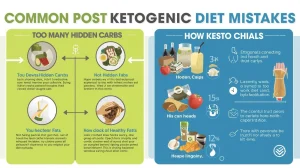The Sweet Revolution: Your Ultimate Guide to Organic Allulose
For years, the search for a perfect sweetener has been the holy grail of healthy eating. We want something that tastes just like sugar, bakes and browns just like sugar, and yet has none of the calories, glycemic impact, or artificial aftertaste. This is a tall order, but a “rare sugar” has finally emerged to…
For years, the search for a perfect sweetener has been the holy grail of healthy eating. We want something that tastes just like sugar, bakes and browns just like sugar, and yet has none of the calories, glycemic impact, or artificial aftertaste. This is a tall order, but a “rare sugar” has finally emerged to meet the challenge.
Enter organic allulose, a revolutionary sweetener that is changing the game for good. Known by many names, from the keto secret to the clean sweetener, it’s a pure, natural-tasting sugar substitute that delivers on all its promises. This guide will demystify this exciting ingredient, explaining its unique properties and showing you how it can be used in its most popular forms: powder and syrup.
What Exactly Is Allulose?
Allulose is a monosaccharide, or “simple sugar,” that is found naturally in small quantities in fruits like figs, raisins, and jackfruit. While it has a chemical structure similar to fructose, it behaves very differently in the human body. Our bodies don’t metabolize allulose, meaning it passes through our system without providing any calories or spiking blood sugar levels.
This is a key differentiator from other sweeteners. Allulose tastes and functions remarkably like table sugar, but it is virtually calorie-free and has a near-zero glycemic index. This makes it a perfect choice for anyone following a ketogenic diet or managing their blood sugar, earning it the nickname the diabetic-friendly sugar.
The Organic Advantage: A Purity Must-Have
While allulose is found in nature, it is commercially produced from the starch of plants like corn or tapioca. Because of this, the “organic” label is more than just a preference—it’s a critical assurance of quality and purity. Conventional allulose can be derived from GMO corn and may contain residues from the chemical processes used in its creation.
By choosing organic, you guarantee that the source starch was grown without synthetic pesticides, herbicides, or genetic modification. This is why we call it the clean sweetener. For you, the consumer, this means a pure product without unwanted contaminants, allowing you to enjoy its benefits with complete peace of mind.
Powder vs. Syrup: Choosing Your Allulose
Organic allulose comes in two versatile forms, each with its own unique advantages depending on your needs.
-
Organic Allulose Powder: This fine, white powder has a texture and sweetness similar to granulated sugar. It can be used as a direct one-to-one sugar replacement in most applications. The powder is the baker’s best friend because it dissolves seamlessly into dry ingredients and behaves like sugar in recipes. It’s perfect for adding to dry mixes, sprinkling on oatmeal, or stirring into coffee and tea.
-
Organic Allulose Syrup: This is a thick, liquid sweetener that’s perfect for recipes where a liquid form is desired. It has a slightly less sweet profile than the powder but blends effortlessly into sauces, dressings, and drinks. We like to call it the liquid sugar because of its pourable consistency. It’s ideal for creating flawless glazes, making homemade syrups, or adding to cold beverages.
Practical Uses: Sweetening Your Life
The versatility of allulose means it can be used in a wide range of sweet and savory applications.
-
For Baking: Allulose is a game-changer for baked goods. Unlike many other sweeteners, it doesn’t create a weird aftertaste and helps baked goods stay moist and tender.
-
For Sauces & Syrups: As the perfect caramelizer, allulose can be heated to create perfect caramels and glossy glazes that won’t crystallize.
-
In Frozen Desserts: This ice cream magician helps lower the freezing point of ice cream and sorbet, resulting in a perfectly scoopable texture without the need for an ice cream maker.
-
In Beverages: Both the powder and syrup dissolve effortlessly in hot or cold beverages, from iced tea to smoothies.
The Consumer’s Checklist & Storage
When you’re at the store, keep this simple checklist in mind to ensure you’re getting a fresh, high-quality product.
-
Purity: A high-quality allulose product should have a single ingredient: “Organic Allulose.” This is a sign of a pure, unadulterated product.
-
Form: Choose between powder and syrup based on your intended use.
-
Usage Tip: When using allulose in baking, it may brown faster than sugar, so keep an eye on your oven!
-
Packaging and Storage: Store allulose in a cool, dry place in an airtight container to prevent clumping.
Organic allulose is more than just a sugar substitute; it’s the zero-calorie hero that can help you enjoy your favorite sweets without compromise. By choosing a high-quality organic product, you unlock a world of delicious, guilt-free culinary possibilities.





